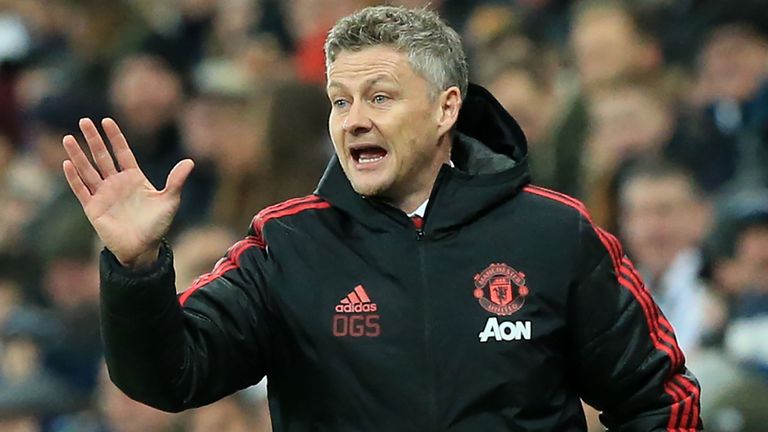Defensive woes, too many failed passes, a pressing game that fell down. No trophies. And ultimately, not enough wins.
Those were the statistics behind the struggles that led to Ole Gunnar Solskjaer’s exit from Manchester United.
Solskjaer will always be a legend at Old Trafford for scoring the dramatic winner against Bayern Munich in the 1999 Champions League final – but as a manager, he couldn’t bring back the glory days of Sir Alex Ferguson’s 26-and-a-half-year reign.
The Norwegian is the fourth permanent United boss to lose his job in the eight years since Ferguson stepped down at the end of the title-winning 2012-13 campaign. So how does he compare with the other three? And where did Solskjaer’s United fall short on the pitch?
How the post-Fergie managers have fared
Former United striker Solskjaer returned to Old Trafford on an interim basis in December 2018 to replace Jose Mourinho.
He departs with the second-best win record of United’s post-Ferguson managers, winning 91 of his 168 games in charge across all competitions – a better percentage return than David Moyes, Louis van Gaal or Mourinho managed.
Van Gaal and Mourinho, though, both won trophies. The Dutchman lifted the FA Cup in 2016 – shortly before he was sacked – and Mourinho led United to a Europa League and EFL Cup double in 2017.
Where none of United’s past four permanent managers have succeeded is in bringing the Premier League title back to Old Trafford. Ferguson’s 13th and final title, won in 2013, remains United’s last.
In his two full seasons in charge, Solskjaer guided United to two top-three Premier League finishes. They were third in 2019-20, before they finished runners-up to Manchester City last season. But he missed out on a trophy as his side lost on penalties to Villarreal in the Europa League final in May.
The Norwegian achieved a win percentage of 54.2%, behind Mourinho’s 58.3% in 144 matches but ahead of Moyes (52.9%), Van Gaal (52.4%) and fellow ex-player Ryan Giggs – who won two of the four games he oversaw as interim coach.
However, appointed to better reflect the philosophy of the club – including an attacking tradition – United did manage to score 64 more goals under Solskjaer than they did with Mourinho in charge – in just 14 extra games.
| Man Utd mangers since Ferguson – all competitions | |||||||
|---|---|---|---|---|---|---|---|
| Manager | Games | Won | Drawn | Lost | For | Against | Win % |
| Moyes | 51 | 27 | 9 | 15 | 86 | 54 | 52.9 |
| Giggs | 4 | 2 | 1 | 1 | 8 | 3 | 50 |
| Van Gaal | 103 | 54 | 25 | 24 | 158 | 98 | 52.4 |
| Mourinho | 144 | 84 | 32 | 28 | 244 | 121 | 58.3 |
| Solskjaer | 168 | 91 | 37 | 40 | 308 | 183 | 54.2 |
| Solskjaer’s managerial record in all competitions |
What have Man Utd struggled with this season?
Under Solskjaer, United have scored a lot but conceded too many. His team conceded 183 goals in his 168 matches – an average of 1,09 per game. Mourinho’s United let in 121 in 144 matches – an average of 0.84.
Only the current top four have outscored seventh-placed United this season – but only the bottom two sides, Norwich City and Newcastle United, have conceded more.
In 12 league games, United have managed just two clean sheets. So why is that?
One factor is an excess of defensive mistakes. Their 11 errors leading to shots on goal is the joint-worst tally in the division, alongside Arsenal, while only three sides have committed more errors leading directly to goals.
Another factor is that Solskjaer’s team have given the ball away too often in key areas – and have then failed to win it back. Of all the teams in the Premier League, only Leicester City fare worse for failed passes in their own half, while only four teams have a lower tackle success rate.
United’s pressing tactics were criticised heavily in the wake of the dismal 5-0 home defeat by Liverpool in October, and the stats also suggest Solskjaer’s side were lacking in this regard.
They have regained possession in the final third just 45 times this term – less than four times a match, and a total lower than it is for all but five other Premier League clubs. Liverpool, the Premier League’s best team for winning the ball back deep in opposing territory, have done so 74 times this season.
Whoever takes over at Old Trafford will know that improving those numbers – and quickly – will be key to bettering their league position, and perhaps salvaging their season.
BBC





